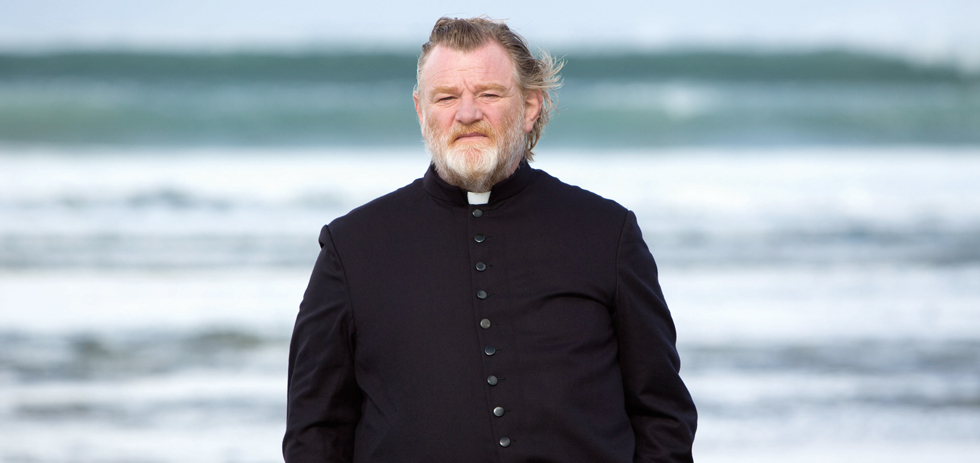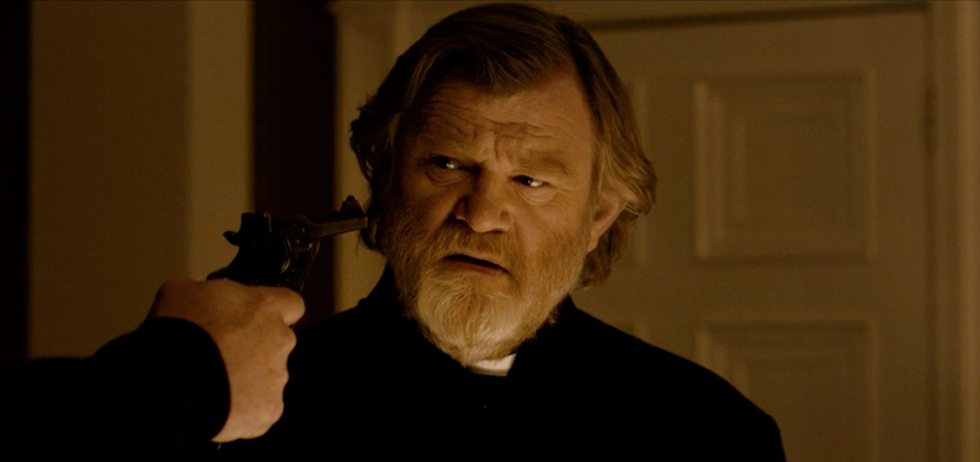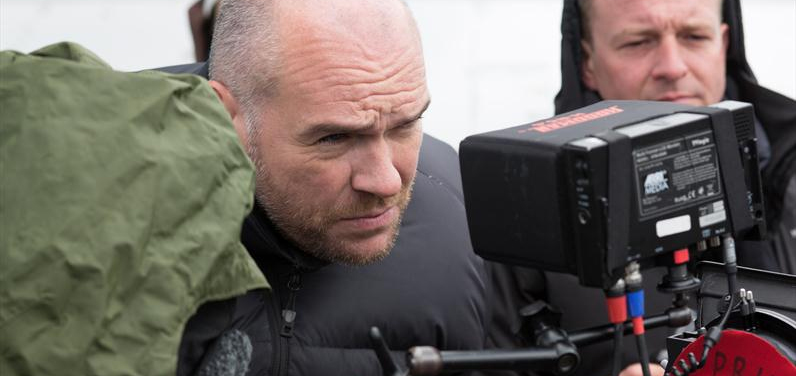John Michael McDonagh’s second feature, Calvary, has a lot to live up to. The Guard, his debut, is the highest grossing Irish film ever but rather than make the same film twice, he’s boldly ventured into a dark and brooding film about faith, disillusionment and literature. We sat down with him ahead of the Australian premiere of Calvary at Sydney Film Festival.
So first off, the title, Calvary, which, if I’m not mistaken, is the hill on which Jesus was crucified?
Yeah it’s also got to do with suffering that leads up to it as well.
Did you choose that title to position Brendan Gleeson’s character as someone who is preparing to give himself up for sinners in this community?
I always like to start writing a script knowing what the title is. I always have the title first. I can’t actually start writing until I’ve figured out what the title is. I think it’s quite important. Then, if you get it right, titles can become more than they actually are, more than the word actually means. The title The Guard doesn’t actually mean much but if the film’s successful it becomes something else. It was to differentiate itself from The Guard, I mean it’s called Calvary, so you’re implying that it’s not going to be The Guard 2.
It’s also a title that people need to stop and read twice, because of the way it’s spelt.
Because of ‘cavalry’, yeah. (laughs)
It’s good though, that the title is intriguing and makes you wonder why it’s called that.
Yes, and maybe people look it up and realise what it means –
– I actually thought it was a place in Ireland, initially. The name of the village, perhaps.
Ah, right. See I was surprised by that because I thought Calvary was actually more well known. Obviously Roman Catholics know what it is and I would assume Church of England people, Anglicans, whoever. I thought, you know, it was much more widely known. It’s also called Gorgotha – the place of the skull, or something. I was quite surprised when it started to come up that people had to look it up and see what it meant. I thought everyone knew what the place meant.
I do think, though, that once you know what the title means the film starts to make sense –
– it all slots into place, yeah.
In terms of references and understanding concepts in the film, one of the things that surprised me the most is that the film seems very much steeped in literature. You’ve got references, mainly through M. Emmett Walsh’s The Writer character, to John Banville, he mentioned Banville as a high watermark. He is given Binet’s HHhH to read at one point and –
– and the other main book is by David Gates and is about an alcoholic.1
Yes, that was on his nightstand. What I’m wondering is that because all of the characters seem literate, even the man revealed to be the ‘killer’ recites the plot of Moby Dick –
Well I think both The Guard and Calvary are very novelistic rather than visual movies and that is why. I mean, I don’t usually have characters who are stupid or not very literate. Even the ‘stupid’ characters say and speak in an epigrammatic way and that’s because I just hate all of those sort of naturalistic movies where people never say anything. You’d be watching the film for 45 minutes and no one’s said anything interesting. And that’s quite common, you know. So I’m definitely against that. I think, when you’re sitting on your own writing these scripts, you’re trying to amuse youself, so you’re putting in those references to amuse youself and you go, oh maybe somebody out there will suddenly go “Oh God that means or that refers to blah blah blah or whatever”. So you put in those kind of easter eggs.

I actually studied The Guard at university for Modern Irish Literaure, slotted in by our professor as a way to, I guess get us into Irish Literature through comedy, so once I started to realise all of the literary references peppered in it gets you thinking.2 I figured that Domnhall Gleeson’s character being named Joyce wasn’t because, of course, everyone in Ireland is named Joyce, but because you were making a statement about James Joyce’s cannibalistic influence on the Irish literary canon. Then I had to stop myself.
(Laughs). Yeah, you know, sometimes you can read into too much stuff. But a lot of the names are references to writers and that. I started off trying to write novels. I wrote five bad novels, then I decided to switch to writing screenplays. I will say, though, that if you think something is a reference, it probably is.
As you were saying, with even the characters who are stupid are literate, maybe this question is especially in relation to The Writer, that they use their knowledge of literature as sort of an affectation or a way to show that they would rather spend time learning, like Gleeson’s character does too, as a way to experience a literary world rather than living the real one.
Ah, right. I see what you’re saying there. The M. Emmett Walsh character, I always had in my mind that he was running from a disasterous life, in some way. I mean, if you look at the little kid doing the painting, he refers to these ghost stories that he’s been reading, well that’s a reference to M.R. James, who would have these kind-of brooding short stories that would usually be set in a small seaside town where somehting sinister happens, so that’s a reference there.3 A way of detaching youself from life, I haven’t thought of that actually, but it might be true.
I mention it also because in the final scene of the movie there’s a line about detachment –
Well Dylan Moran’s character also says something about detachment and there’s an earlier reference as well, I’m sure. But in the final confrontation, when [redacted, killer’s name] says “did you cry?” and Brendan says “well, when you watch something on TV you feel detached” and there is that kind of thing all the way through.
With the idea of detachment it seems that one of the themes that’s been written about a lot with regards to the film is the idea of disillusionment with the church in Ireland – it pops up a lot in dialogue. I don’t think the film itself is, necessarily, critical of the church –
To me it’s not an anti-religious film, it’s an anti-authoritarian film. It’s against people who just follow any blind idiots from anybody. Whether it’s the church, whether it’s the government, whether it’s financial institutions telling you how you should invest your money, you know, that’s all God. All those things are God. The police telling you what to do, well the police colluded with the church in covering up child abuse. And, as an anarchist, which is what I think of myself, I think why listen to any of these institutions at all?

There’s a line in the film about that, which is “You’re a bit too sharp for this parish”, which was a really great line about that concept. One of the things that has been noted a lot is the fact that Brendan Gleeson is in the film and between you and your brother, that’s four films with him.4 So I’m wondering if you have a Samuel L. Jackson/Marvel 8 film contract with him?
(Laughs). I’ve actually got one more I’m going to do with him, actually.
Is it the one with ‘Bono’ or ‘Bonnet’ in the title?
No, actually, that is a good script, though. That’s called The Bonnot Gang and it’s a true story about this group of French anarchists, bank robbers in 1911. I’d say that would be like your DePalma or Scorsese type movie, it’d be like your seventh or eight movie, once you’ve figured out everything about making movies that’s when you can make The Bonnot Gang. It’s quite a big shoot-em-up.
Well that certainly has a strong title as well.
Yeah that would be a cross between The Wild Bunch and Le Samourai. Now I’ll move on. (laughs) The final part of this trilogy is going to be called The Lame Shall Enter First and Brendan will be playing an ex-cop who was shot in the back and he’s now a paraplegic living in London and he hates all able-bodied people. So he only associates with disabled people and they all go out, taking crack and drinking a lot. And one of them gets murdered in what appears to be a random attack so, in order to get his life back in order, he decides to investigate the murder. So it has the black comedy and it has the thriller element to it as well. And that’ll be the final one in the trilogy.
That’s interesting because The Guard plays off of buddy-cop elements, Calvary is a lot more dark and contemplative and this last one shows that, I guess, you are subtly playing with genre.
I guess, the more I think about it, the last one will be an amalgamation of The Guard and Calvary. It’ll have more of the thriller-investigative whodunnit but it will also have the black comedy and really dark anti-society type themes. This guy, a paraplegic who hates society, he hates everyone. It’s not just specific institutions, he would hate you because you can walk. So that would be the final sort of nihilistic nail in the coffin, I guess.
One of the things you have said previously in an interview is that you hate the theatre, which is interesting because there were a few scenes in Calvary that I thought were theatrical.
I would agree with your earlier concept that it’s novelistic, though.
The continuous references to literature would suggest that, in the way the film approaches the idea of storytelling and ‘the third act’ –
– and that whole metafiction stuff where you comment on yourself.
There was a lot more metafiction than I was expecting, which is good. Especially when you have metafiction happening on the rolling Irish hills.
Where you’re expecting naturalistic dialogue and then, in the scene they’re playing it’s different. I can see that. I mean, it’s funny, we’ve already had a couple of inquiries about doing Calvary as a play.
Really?
Yeah but I’m saying no, I’m so against theatre. I’m gonna hold out unless some Broadway producer comes through –
– and what, make it into a snazzy musical?
Well, you know what, you could do it as an opera.
That’s really interesting, I’d love to see that. A Brendan Gleeson character operatically singing as his church burns to the ground.
Just those big images, so it could work that way – I wouldn’t completely rule it out. I find theatre really incredible boring, it’s expensive, it’s moralistic, very moralistic. All these so-called great playwrights, you see them and you go, ugh, this is great? This is meant to be great? It’s awful, really awful. Though, I did recently see a good one, Mark Strong was in a revival of Arthur Miller’s A View from the Bridge and it was this Belgian director and they did it in the Young Vic in London and he did it in a really cinematic way and he didn’t do all of the crappy, you know, the breaks, where it’s basically to get you to go to the bar to get a drink. So they’ve broken up the whole play to get you to spend money. This version just runs straight through, two hours.5
As it probably should. You wouldn’t think Arthur Miller was wanting to add in “Act Break: Make Sure They All Get Peanuts”
Go off, get a drink, forget about what you’ve seen so when you come back in you go, “oh, yeah, this that happened twenty minutes ago”
You’ve said in another interview that you could see the film being “set in a small town in Spain” or a small town anywhere yet some critics, specifically the Irish Times, have said that your characters in Calvary are caricatures, they called it “Little Irelandia”.
I think what you have to remember about Irish critics is that a lot of them not all of them, but they’re very insecure and they’re obsessed with how they’re being viewed by the rest of the world. So the reviews you get out of Ireland are completely skewed from the reviews we got out of America, the UK and Berlin. It’s almost like they’re saying ‘what will people think of us?’, you know, it’s like they would be like, I’m from South London and it would be like me watching Gary Oldman’s Nil by Mouth and saying that it’s a terrible depiction of South Londoners and I would never say that. The film is either true or enjoyable or its not. To have that kind of reading of a movie, I mean these people don’t exist. Of course all of these crazy eccentrics probably don’t exist in one small town at this moment, but it’s a heightened reality. It’s not a Ken Loach movie. There is that terrible insecurity, though. I won’t harp on about it but it’s a very Dublin thing. I’ve gone on record about shooting outside of Dublin, shooting on location because I’m getting tired of these Dublin movies. All these critics live in Dublin and they’re all kind-of middle class Dublin critics, and they all are friends with all of those filmmakers who are making those movies. So obviously, if I start slagging them off, it reflects on all of their friends.
Do you think that the criticism is amplified by the fact that The Guard is the highest grossing Irish film ever?
Yes! Yeah, and you see, the thing is, they don’t really see all of those references, you know. As the film being literate. They still have this kind of ‘oh, it’s a bluff, racist cop in the West of Ireland’ – he’s not even racist, he’s confrontational, he’s winding people up for a laugh. So they can’t even see through the first layer because they have this in-built agression towards me. They also know that I’m born and grew up in London, so I’m not born in Ireland even though my family’s Irish, so they already have that prejudice against me in that way. If they knew nothing about me, at all, if I gave no interviews and so they wouldn’t hear my accent, maybe the reviews would have been different.6 You just don’t know.
I think that’s it. Thanks a lot for taking the time to talk.
No, thanks a lot. Cheers.
Calvary plays twice at the festival, on Thursday 5th and Friday 6th June. Tickets can be purchased here.
